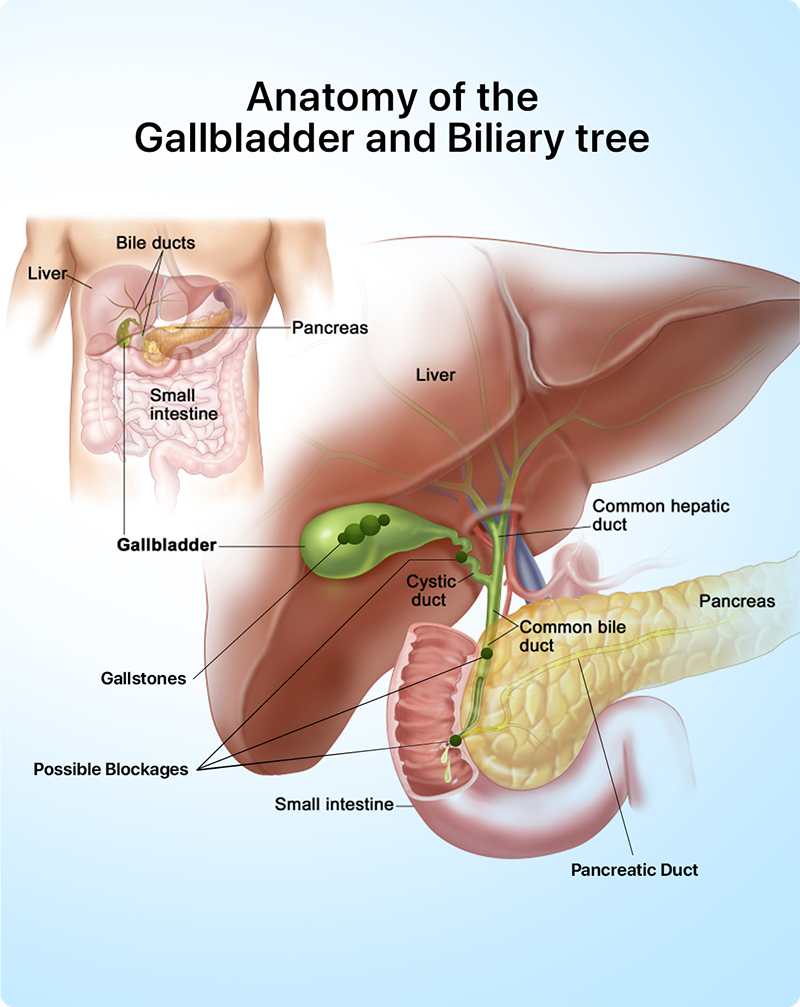
Dr. Lee Ser Yee, Senior Consultant Hepatopancreatobiliary Surgeon at Surgical Associates based in Mount Elizabeth Hospital explains what gallstones are, who is at risk of gallbladder disease and how to prevent it.
The gallbladder is a small organ in your upper right abdomen that lies beneath the liver and
is connected to the bile duct. The gallbladder stores a yellowish liquid produced by the
liver called bile that helps your body digest oily and fatty food.
Before a meal, the gallbladder may be filled with bile and is about the size of a small
pear. During and after meals, the gallbladder squeezes the stored bile into the small
intestine through a tube called the common bile duct.
In another words, the gallbladder functions as a storage organ for bile and is thus not
essential for life, as most of the bile produced by the liver will still flow into the
intestines without the gallbladder.

Small pebble-like deposits called gallstones can form in the gallbladder. Normally, bile
acids and proteins prevent the formation of stones; however, when there is an imbalance in
the bile constituents, gallstones can form.
Gallstone symptoms include intense or episodic abdominal pain, back pain, pain on the right
shoulder or between the shoulder blades, bloatedness, discomfort or indigestion, nausea and
vomiting.
Gallstones are the most common result of gallbladder disease and one of the most common
causes of upper abdominal pain. The treatment of gallbladder disease will depend on the
situation – whether it is asymptomatic, symptomatic or complicated. Most patients experience
no symptoms even if they have gallstones (asymptomatic). For this group, gallstones are
usually diagnosed during health screenings or tests for other health conditions e.g., blood
tests or ultrasound scan. In some cases, the first realisation of having gallstones is a
gallstone-related complication such as acute cholecystitis, jaundice or pancreatitis.
A scan is necessary to confirm gallstones. Most commonly, an ultrasound is performed. Stones
and gallstone related complications may also be evaluated on CT scan or MRI of the abdomen.
In addition, blood tests may be done to rule out any obstruction of the bile ducts and
infection.
When a gallstone is confirmed, doctors will advise the patient on the most suitable
gallstone treatment. In most cases, if necessary, the treatment for gallstones is surgery to
remove the gallbladder and the stones within.(Cholecystectomy)
Gallstones causes differ from one person to another. While it is not known why such imbalances in the bile components occur, some people are more prone to develop gallstones. Some of the reasons are:
There is no proven way to prevent gallstones, but research suggests some possibilities. By modifying your lifestyle, you can potentially lower your risk of developing gallstones and gallbladder disease. Some of these lifestyle modifications include:
Fats, especially saturated fats found in meats, butter and animal products, are associated with gallstone attacks.
Some studies have found that a cup of coffee a day can lower the risk of gallstones as caffeine in coffee can stimulate gallbladder contractions and lower the cholesterol. This may be related with many other lifestyle confounders and the current evidence and understanding is not conclusive.
Some studies have found that while limited and moderate alcohol intake reduces
the risk of gallstones, but heavy drinking may do the opposite. This may be
related with many other lifestyle confounders and the current evidence and
understanding is not conclusive.
It is important to highlight that pregnant women and those with liver disease should avoid alcohol.
Regular exercise, active lifestyle and a healthy balanced diet will minimise many of the risk factors of gallstones.
To know more about the treatment of gallstones and gallbladder disease, please read - Treatment of Gallstones

Mount Elizabeth Medical Centre
#08-07, 3 Mount Elizabeth, Singapore 228510
Tel: 6454 0054
|
Fax: 6764 0054
|
Email: ask@surgicalassociates.sg
Gleneagles Medical Centre
#05-01, 6 Napier Road, Singapore 258499
Tel: 6471 0054
|
Fax: 6271 0054
Need medical advice from Dr Lee or Dr Tan? Leave us a message and we will attend to you within one working day.